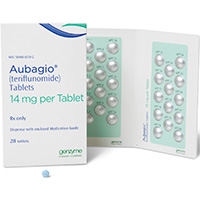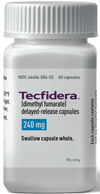 Sanofi's ($SNY) Aubagio seemed destined to be the overlooked middle child of oral multiple sclerosis therapies: Overshadowed from birth by Novartis' ($NVS) first-to-market MS pill Gilenya, Aubagio quickly had to contend with a precocious younger rival, Biogen's ($BIIB) Tecfidera.
Sanofi's ($SNY) Aubagio seemed destined to be the overlooked middle child of oral multiple sclerosis therapies: Overshadowed from birth by Novartis' ($NVS) first-to-market MS pill Gilenya, Aubagio quickly had to contend with a precocious younger rival, Biogen's ($BIIB) Tecfidera.
But Aubagio may be stepping out of those shadows. For the third quarter, Aubagio brought in €225 million ($247 million), an amount easily dwarfed by Gilenya's $696 million and Tecfidera's $937 million. But that was a major leap for Aubagio--81%--compared with slowing growth for the other two meds.
And Sanofi touted that fact during its "meet management" presentations Friday. Aubagio's market share has ramped upward this year as Gilenya and now, Tecfidera, have leveled off. Aubagio still only has about 6% of total oral MS scripts--compared with Gilenya's 10% and Tecfidera's 21%--but Sanofi sees the growth trajectory continuing.
 That's partly because, at least for now, Aubagio is the only MS pill that doesn't have any associated reports of a rare brain infection, progressive multifocal leukoencephalopathy (PML), that has cropped up in patients on Gilenya and Tecfidera. Biogen CEO George Scangos blames the Tecfidera sales slowdown on the FDA's cautionary announcement last year about PML case reports; in August, scientists predicted more cases and called for Tecfidera patients to be monitored for the virus that can trigger it.
That's partly because, at least for now, Aubagio is the only MS pill that doesn't have any associated reports of a rare brain infection, progressive multifocal leukoencephalopathy (PML), that has cropped up in patients on Gilenya and Tecfidera. Biogen CEO George Scangos blames the Tecfidera sales slowdown on the FDA's cautionary announcement last year about PML case reports; in August, scientists predicted more cases and called for Tecfidera patients to be monitored for the virus that can trigger it.
And Sanofi points to some clinical data that it thinks can help make Aubagio's case: In the TOPIC study, Aubagio beat placebo at staving off relapses in patients experiencing their first MS symptoms; its rivals don't have data in early MS. The drug also has some new data showing delays in disability progression, Sanofi points out, and another study showed that it slowed the loss of brain volume in patients with the relapsing form of the disease.
At the 12-month mark in the latter study, presented last month at the Congress of the European Committee for Treatment and Research in Multiple Sclerosis, the drug slowed brain loss 36.9% more than placebo with a 14-mg dose and 34.4% with a 7-mg dose. After 24 months, the differences were 30.6% and 27.6% respectively. The company said that adverse effects, including nausea and alopecia, were about the same for Aubagio patients as for those taking placebo.
On Friday, Sanofi said it's aiming to grow its MS franchise to €2 billion by 2020, mostly on growth from Aubagio and the even newer intravenous med Lemtrada, but partly on in-development biologics Sanofi hopes will prove to help restore the myelin sheath that protects healthy nerves, rather than slowing its destruction as current immune-modulating drugs do.
Of course, Sanofi isn't operating in a market vacuum; Novartis and Biogen have their own hopes for their pills, and injectable therapies--new and old--will be battling to win back the market share lost to oral meds over the past few years. Roche ($RHHBY) has a potential game-changer in ocrelizumab, which is the only MS therapy that can boast positive data in the hard-to-treat progressive form of the disease. Due for an FDA submission early next year, the Roche med could not only ran up sales in progressive MS, but that data could also help it charge into the relapsing market, analysts say. Bernstein's Tim Anderson, for instance, figures the Roche med could compete even as a first-line therapy.
- check out the Sanofi presentation (PDF)
Special Report: The top 10 best-selling multiple sclerosis drugs of 2013 - Aubagio